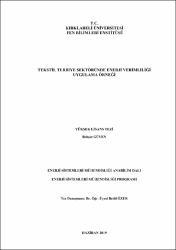Tekstil Terbiye Sektöründe Enerji Verimliliği Uygulama Örneği

View/
Access
info:eu-repo/semantics/openAccesshttp://creativecommons.org/licenses/by-nc-nd/3.0/us/Date
2019-06-28Metadata
Show full item recordCitation
Güven, B. (2019). "Tekstil Terbiye Sektöründe Enerji Verimliliği Uygulama Örneği", Yüksek Lisans Tezi: Kırklareli Üniversitesi Fen Bilimleri Enstitüsü.Abstract
Günümüzde gelişen teknoloji ve sanayi ile birlikte enerji tüketimi artmaya devam etmekte ve doğal enerji kaynakları hızla tükenmektedir. Bu nedenle enerjinin verimli kullanılması, israfının önlenmesi ve enerji maliyetlerinin düşürülmesi önem kazanmaktadır. Enerji verimliliği, tüketilen enerji miktarının, üretimdeki miktar ve kaliteyi düşürmeden iktisadi kalkınmayı ve sosyal refahı engellemeden en aza indirilmesi biçiminde ifade edilmektedir. Tekstil endüstrisi, sağladığı istihdam imkanı, üretim sürecinde yarattığı katma değer ve uluslararası ticaretteki payı nedeniyle Türkiye ekonomisinde önemli bir yere sahiptir. Ayrıca tekstil sektörü enerjinin yoğun ve verimsiz kullanılması nedeniyle sanayi sektörleri içerisinde büyük enerji tasarruf potansiyeline sahip sektörler arasında yer almaktadır.Enerjinin verimsiz kullanılması üretimdeki enerji maliyetinin payını artırmakta dolayısıyla verimlilik çalışmaları giderek önem kazanmaktadır. Bu çalışmada bir kumaş boyama fabrikasındaki enerji verimliliği uygulamaları incelenmiş ve elde edilen enerji tasarrufu sonuçları değerlendirilmiştir. Çalışma kapsamında öncelikle fabrikadaki enerji tüketimi kaynakları ile birlikte ortaya konulmuş, uygulanan enerji verimliliği çalışmaları incelenmiştir. Spesifik enerji tüketimi ve üretim arasındaki ilişkiler regresyon analizi ile incelenerek kümülatif toplam değerler (CUSUM) grafiği ile detaylandırılmıştır. Elde edilen sonuçlarla endüstri için sürdürülebilir üretim perspektifinden bazı önerilerde bulunulmuştur. Ayrıca uygulanması planlanan enerji verimliliği çalışmaları ve sonuçları değerlendirilmiştir. Bu çalışmada sonuçları verilen uygulamaların tekstil sektörü dışındaki fabrikalara da öncülük ederek uygulamaların yaygınlaşmasına, enerji verimliliği uygulamalarının artarak ülkemizin enerji yoğunluğunun azalmasına katkıda bulunacağı düşünülmektedir. Today, with the developing technology and industry, energy consumption continues to increase and natural energy resources are rapidly depleted. For this reason, it is important to use energy efficiently, to prevent waste and to reduce energy costs. Energy efficiency is expressed in the United Nations Development Program (UNDP) as the amount of energy consumed is minimized without hindering economic development and social welfare without reducing the quantity and quality in production. The textile industry, which provides employment opportunities, has an important place in Turkey's economy and international trade due to the share of the value added created during the production process. In addition, the textile sector is among the sectors with great energy saving potential among the industrial sectors due to the intensive and inefficient use of energy.Inefficient use of energy increases the share of energy costs in production, thus efficiency studies are becoming increasingly important. In this study, energy efficiency applications in a fabric dyeing factory were examined and the energy saving results obtained were evaluated. Within the scope of the study, firstly, the energy consumption sources in the factory were put forward and the energy efficiency studies applied were examined. The relationship between specific energy consumption, energy cost and production is examined by regression analysis and detailed with CUSUM graph. With the results obtained, some suggestions were made from the perspective of sustainable production for the industry. Furthermore, the energy efficiency studies and the results planned to be implemented were evaluated. It is thought that the applications given in this study will contribute to the spread of the applications by leading the factories outside the textile sector, and the energy efficiency applications will increase and decrease the energy density of our country.
Collections
- Tez Koleksiyonu [88]
The following license files are associated with this item:



















